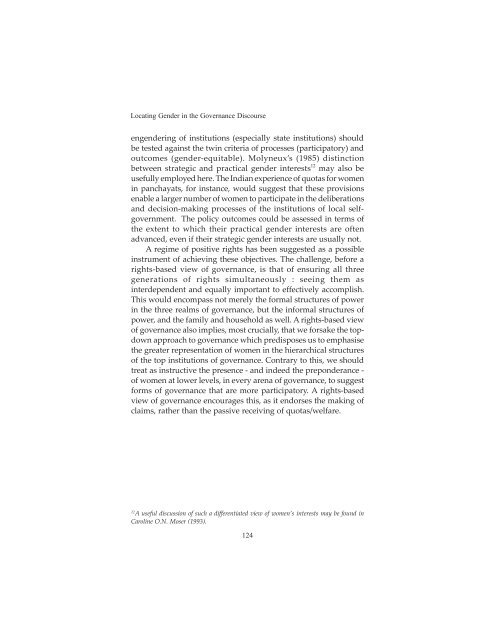Essays On Gender And Governance - United Nations Development ...
Essays On Gender And Governance - United Nations Development ...
Essays On Gender And Governance - United Nations Development ...
Create successful ePaper yourself
Turn your PDF publications into a flip-book with our unique Google optimized e-Paper software.
Locating <strong>Gender</strong> in the <strong>Governance</strong> Discourse<br />
engendering of institutions (especially state institutions) should<br />
be tested against the twin criteria of processes (participatory) and<br />
outcomes (gender-equitable). Molyneux’s (1985) distinction<br />
between strategic and practical gender interests 12 may also be<br />
usefully employed here. The Indian experience of quotas for women<br />
in panchayats, for instance, would suggest that these provisions<br />
enable a larger number of women to participate in the deliberations<br />
and decision-making processes of the institutions of local selfgovernment.<br />
The policy outcomes could be assessed in terms of<br />
the extent to which their practical gender interests are often<br />
advanced, even if their strategic gender interests are usually not.<br />
A regime of positive rights has been suggested as a possible<br />
instrument of achieving these objectives. The challenge, before a<br />
rights-based view of governance, is that of ensuring all three<br />
generations of rights simultaneously : seeing them as<br />
interdependent and equally important to effectively accomplish.<br />
This would encompass not merely the formal structures of power<br />
in the three realms of governance, but the informal structures of<br />
power, and the family and household as well. A rights-based view<br />
of governance also implies, most crucially, that we forsake the topdown<br />
approach to governance which predisposes us to emphasise<br />
the greater representation of women in the hierarchical structures<br />
of the top institutions of governance. Contrary to this, we should<br />
treat as instructive the presence - and indeed the preponderance -<br />
of women at lower levels, in every arena of governance, to suggest<br />
forms of governance that are more participatory. A rights-based<br />
view of governance encourages this, as it endorses the making of<br />
claims, rather than the passive receiving of quotas/welfare.<br />
12<br />
A useful discussion of such a differentiated view of women’s interests may be found in<br />
Caroline O.N. Moser (1993).<br />
124

















